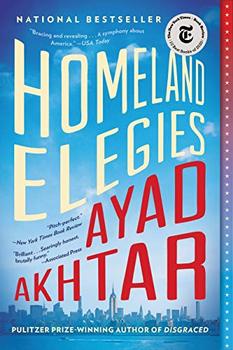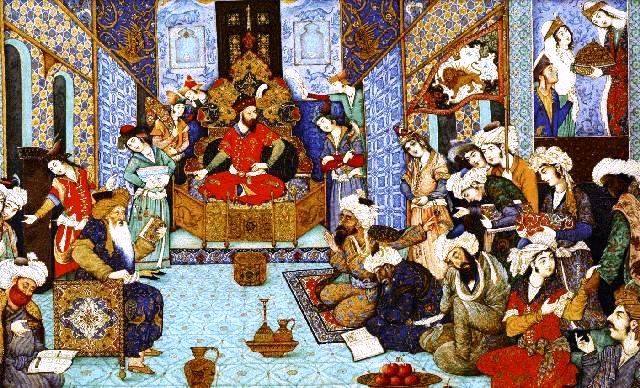Summary | Excerpt | Reading Guide | Reviews | Beyond the Book | Read-Alikes | Genres & Themes | Author Bio

Critics' Opinion:
Readers' Opinion:
First Published:
Sep 2020, 368 pages
Paperback:
May 2021, 368 pages
 Book Reviewed by:
Book Reviewed by:
Grace Graham-Taylor
Buy This Book
This article relates to Homeland Elegies
 In Homeland Elegies, author Ayad Akhtar explores Pakistani characters' relationships to Islam. The roots of Islam in the area now known as Pakistan can be traced back almost as far as the birth of the religion itself. As early as the 7th century, Arab armies attempted to spread Islam to the Indian subcontinent, but it took centuries for it to establish a true presence there.
In Homeland Elegies, author Ayad Akhtar explores Pakistani characters' relationships to Islam. The roots of Islam in the area now known as Pakistan can be traced back almost as far as the birth of the religion itself. As early as the 7th century, Arab armies attempted to spread Islam to the Indian subcontinent, but it took centuries for it to establish a true presence there.
At the time Arab forces began their conquests, the region that makes up present-day Pakistan was in a period of political instability. Invading nomadic groups, along with warfare between the Persians (who controlled large portions of territory) and the Byzantines, had made the area unsafe and disrupted trade routes. In addition, some parts of the region were controlled by Hindu empires who were constantly fighting to expand their kingdoms. The Arabs initially struggled to maintain territory among all of these competing factions.
Further complications arose in 632 through internal conflict after the death of the Prophet Muhammad, who had not formally named a successor to lead the Muslim people, resulting in disagreements in the community. Some believed that the succession should be by bloodline. Others thought that it was now the community's prerogative to choose a new caliph. This disagreement, and the subsequent battles for succession, was the root cause of the Sunni-Shia split, which continues to divide Muslims to this day. This interior battle for rightful leadership was still raging at the time when the Islamic forces were entering the Indian subcontinent, and the resulting political instability weakened the ability of the Arabs to maintain control in the region. Even when they did manage to conquer an area, their rule was unstable and subject to revolt. For example, parts of what is now Baluchistan were captured by Arab forces from the Persians in 644, but were lost again in 652 due to civilian unrest.
However, a decisive Arabic victory occurred in 713 under the leadership of Muhammad bin Qasim, nephew of the governor of the eastern Islamic empire, when he conquered the province of Sindh (in the southeast of modern-day Pakistan), which created an opening for the establishment of Islam in the subcontinent. The Arab governors put in charge of the province maintained control under a policy of religious tolerance, which led to a fusion of the cultures of the Arabs and the Sindhi. This bond was cemented by the translation of the Quran into Sindhi (the first language into which the text was translated).
By the 11th century, Islam had spread throughout Pakistan. Most of the 11th and 12th centuries in the area are known as the Ghaznavid period, after Mahmud of Ghazni, a Turkic Muslim emperor who consolidated power there. The control established by Mahmud and his successors brought stability to the region and re-opened trade routes.
Existing knowledge and culture in Pakistan and the rest of the Indian subcontinent contributed greatly to The Golden Age of Islam, a period dating from the 8th century to around the 13th century that was characterized by the rapid advancement of Islamic prosperity and learning. For example, the tale of Sinbad the Sailor is believed to have been written in Pakistan before Islamic rule and later collected as part of the celebrated A Thousand and One Nights. The global understanding of mathematics was also enhanced by the culture of the area. Hindu-Arabic numerals were invented in the subcontinent, and a crucial part of this system, the number zero, is thought to have originated in the Taxila region of Pakistan.
Mahmud of Ghazni and his court, unknown artist
Filed under Places, Cultures & Identities
![]() This "beyond the book article" relates to Homeland Elegies. It originally ran in September 2020 and has been updated for the
May 2021 paperback edition.
Go to magazine.
This "beyond the book article" relates to Homeland Elegies. It originally ran in September 2020 and has been updated for the
May 2021 paperback edition.
Go to magazine.





The Flower Sisters
by Michelle Collins Anderson
From the new Fannie Flagg of the Ozarks, a richly-woven story of family, forgiveness, and reinvention.

The House on Biscayne Bay
by Chanel Cleeton
As death stalks a gothic mansion in Miami, the lives of two women intertwine as the past and present collide.

The Funeral Cryer by Wenyan Lu
Debut novelist Wenyan Lu brings us this witty yet profound story about one woman's midlife reawakening in contemporary rural China.
Your guide toexceptional books
BookBrowse seeks out and recommends the best in contemporary fiction and nonfiction—books that not only engage and entertain but also deepen our understanding of ourselves and the world around us.